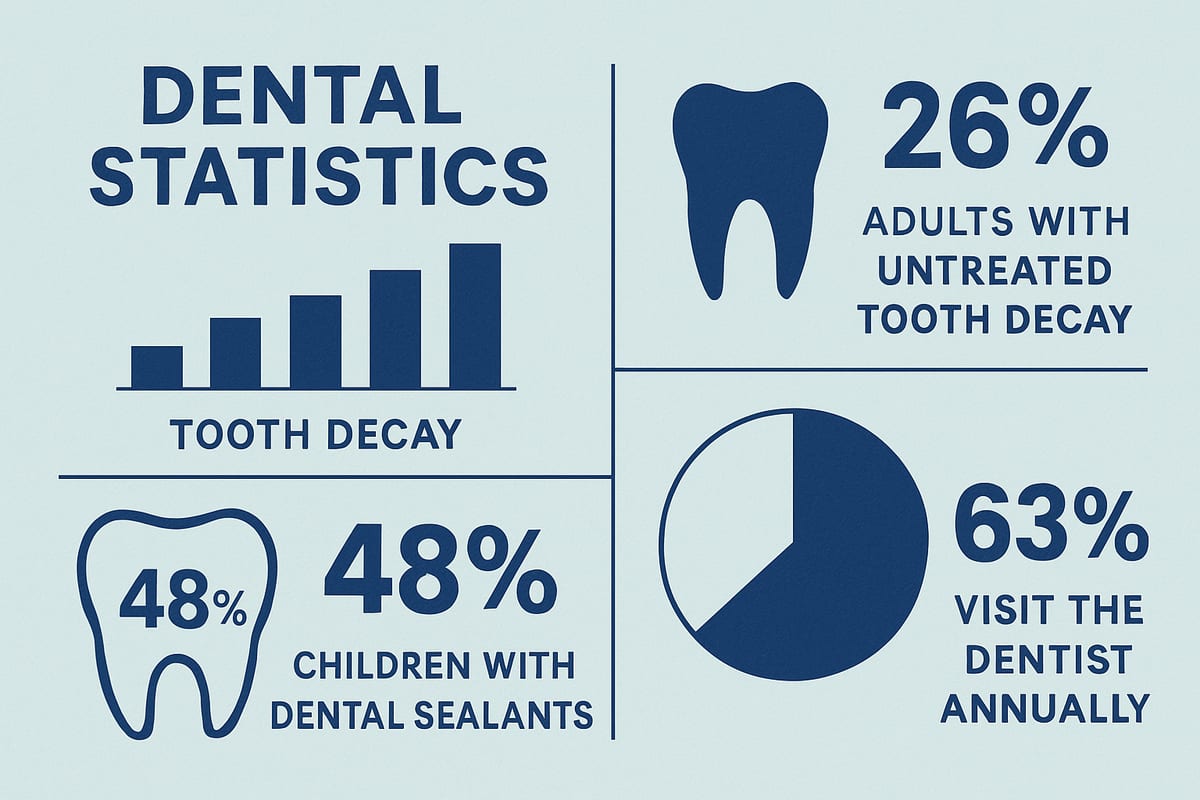Dental statistics show how common dental problems are and why regular care pays off. This post breaks down clear numbers and simple takeaways so you can see why visiting a dentist is a no-brainer. Read on for practical facts, what the numbers mean for your health, and easy actions you can take now.
Key dental statistics everyone should know
How common oral disease is
Tooth decay and gum disease are very common. Worldwide and nationally, roughly most adults will experience cavities at some point, and nearly half of adults show signs of gum disease by middle age. Untreated decay remains widespread, especially in children and older adults. These dental statistics in Jacksonville, FL mirror national trends: cavities and periodontal disease are not rare — they affect everyday people and can get worse without care.
Prevention and care statistics
Only about half to two-thirds of adults get regular dental cleanings and exams each year. Cost, fear, and access keep many people from routine visits; studies suggest around 25–30% skip care mainly because of expense. Skipping checkups raises the odds of emergency visits and more invasive, expensive treatment later. Seeing these dental statistics should encourage making preventive visits a habit.
Costs, tooth loss, and treatment trends
Dental problems can add up. Simple fillings and routine care are relatively affordable, but advanced treatments like crowns, root canals, or implants carry higher costs — implants can run into the thousands per tooth. Tooth loss remains a real issue for older adults; many need crowns, bridges, dentures, or implants to restore function. These dental statistics show a clear financial impact: prevention usually costs less than fixing advanced disease.
What these dental statistics mean for your overall health
Oral-systemic connections
Oral health is linked to whole-body health. Research connects gum disease with higher risk for heart disease, complications with diabetes control, and poorer pregnancy outcomes. When dental statistics show high rates of periodontal disease, that’s not just a mouth problem — it signals potential risks for overall health. Regular dental care can help lower those risks.
Quality of life and daily function
Untreated dental problems affect eating, sleep, speech, and self-confidence. Painful or missing teeth can make it hard to eat nutritious foods, disturb sleep, and reduce workplace productivity. The human side of these dental statistics is simple: better oral health usually means better day-to-day life.
How simple habits and regular dental visits change the numbers
Prevention wins: cleanings, exams, and early treatment
Regular cleanings and exams catch problems early. Patients who see a dentist every six months are far less likely to need extractions or complex restorative work. Early treatment keeps small issues from becoming big, expensive ones and shifts the dental statistics toward better outcomes across communities.
At-home care that moves the needle
Small daily habits make a big difference:
- Brush twice a day with fluoride toothpaste
- Floss daily or use interdental cleaners
- Limit sugary snacks and drinks
- Avoid tobacco and excessive alcohol
- Use mouthguard protection for grinding or sports
These steps reduce cavities and gum disease, improving the dental statistics you see in your family and neighborhood.
Red flags that mean see a dentist now
- Bleeding or swollen gums
- Persistent tooth or jaw pain
- Loose or shifting teeth
- Sores that don’t heal in two weeks
- Severe bad breath or pus around a tooth
Acting quickly when you spot these signs can prevent bigger problems and change the numbers in your favor.
Why choose experienced, long-term dental care
Understanding local dental statistics in Jacksonville, FL shows why experienced care matters. Dr. Jacqueline West of West Dentistry brings strong credentials — degrees from Pepperdine and the University of Florida College of Dentistry, advanced training at the Las Vegas Institute, and membership in major dental organizations. That experience helps catch problems early, plan effective long-term care, and improve the personal outcomes reflected in those dental statistics.
If you want care that focuses on prevention and lasting results, schedule an exam or consultation with West Dentistry to see how simple changes can improve your oral health and the dental statistics that matter most to you.

